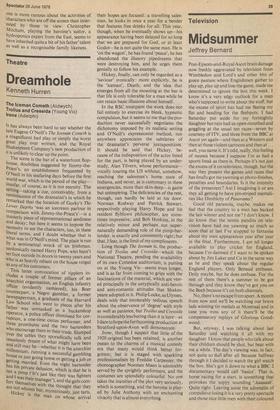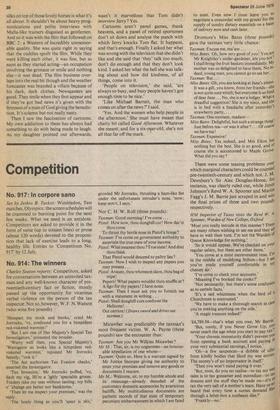Television
Midsummer
Jeffrey Bernard
Post-Epsom-and-Royal Ascot brain damage now freshly aggravated by television from Wimbledon and Lord's and other bits of green pasture where Englishmen gather to play up, play up and lose the game, made me determined to ignore the box this week. I know it's a very edgy outlook for a man who's supposed to write about the stuff, but the excess of sport has had me fleeing my flat and heading for the fleshpots. I had Saturday put aside for my fortnightly daughter but rain had us open-mouthed and goggling at the usual ten races—seven by courtesy of ITV, and three from the BBC at Ascot yet again—and then at a Western and then at those violent cartoons and then at ... well, you name it. It's odd, really, this feeling of nausea because I suppose I'm as bad a sports freak as there is. Perhaps it's not just the excess of it on-television, though, but the way they present the games and races that has finally got me-yawning at photo-finishes, penalties and boundaries. Is it the intensity of the presenters? Am I imagining it or are they all getting to have pin-striped mentalities like Dimbleby of Panorama?
Good old paranoia, maybe, makes me feel that the country to a man has backed the last winner and not me? I don't know. I do know that the tennis pundits on television have had me yawning so much so soon that at last I've stopped to fantasise about my own appearances year after year in the final. Furthermore, I am no longer available to play cricket for England, because I'm damned if I want to be spoken about by Jim Laker and Co in the same way as he and they speak about the regular England players. Only Benaud enthuses. Drily maybe, but he does enthuse. For the rest of them there's a summer to be got through and they know they've got you on the Beeb because it's on both channels.
No, there's no escape from sport. A month from now and we'll be watching our brave lads winning tin medals at Montreal and in case you miss any of it there'll be the compensatory replays of Glorious Goodwood.
But, anyway, I was talking about last Saturday and watching it all with my daughter. I know that people who talk about their children should be shot, but bear with me a while. The day's viewing was, in fact, not quite so dull after all because halfway through it I decided to watch the girl watch the box. She's got it down to what a BBC 2 documentary would call 'basics'. That is, horse racing for a start, is something that provokes the soppy sounding 'Aaaaaah'. Quite right. Leaving aside the adrenalin of compulsive losing it is a very pretty spectacle and those nice little men with their coloured silks on top of those lovely horses is what it's all about. It shouldn't be about heavy prognostications and polite interviews with Mafia-like trainers disguised as gentlemen. And so it was with the film that followed on BBC 2: a Western of incredibly unmemorable quality. She was quite right in saying that the cuddles spoilt the film. While they were killing each other, it was fine, but as soon as they started acting—an occupation involving the grimace or smile and nothing else—it was dead. The film business overlaps into the real bit though and the weather forecaster was branded a villain because of his dark, dark clothes. Newscasters are good. They smile when they first appear and if they've got bad news it's given with the firmness of a man of God giving the benediction. It's solemn but not really nasty.
Then I saw the fascination of cartoons. My own addiction to them has always had something to do with being made to laugh. As my daughter pointed out afterwards, wasn't it marvellous that Tom didn't interview Jerry ? Yes.
Cartoons aren't panel games, thank heavens, and a panel of retired sportsmen don't sit down and analyse the punch with which Jerry knocks Tom fiat. It happens, and that's enough. Finally I asked her what was wrong with the television that she didn't like and she said that 'they' talk too much, don't do enough and that they don't look kind. I asked her what the hell she was talking about and how did kindness, of all things, come into it.
'People on television,' she said, 'are always so busy, and busy people haven't got enough time to be nice.'
'Like Michael Barratt, the man who comes on after the news ?' I said.
'Yes. And the women who help people in the afternoon.' She must have meant that chatty bit called Good Afternoon. Whatever she meant, and for a six-y9ar-old, she's not all that far off the mark.















































 Previous page
Previous page